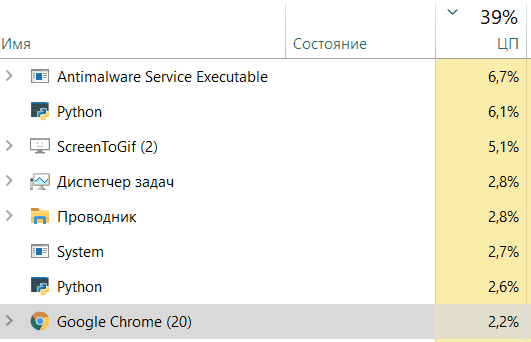
Security News
AI Agent Lands PRs in Major OSS Projects, Targets Maintainers via Cold Outreach
An AI agent is merging PRs into major OSS projects and cold-emailing maintainers to drum up more work.
parallelbar
Advanced tools
Parallelbar displays the progress of tasks in the process pool for Pool class methods such as map, starmap (since 1.2 version), imap and imap_unordered. Parallelbar is based on the tqdm module and the standard python multiprocessing library.
Also, it is possible to handle exceptions that occur within a separate process, as well as set a timeout for the execution of a task by a process.
pip install parallelbar
or
pip install --user git+https://github.com/dubovikmaster/parallelbar.git
from parallelbar import progress_imap, progress_map, progress_imapu
from parallelbar.tools import cpu_bench, fibonacci
Let's create a list of 100 numbers and test progress_map with default parameters on a toy function cpu_bench:
tasks = range(10000)
%%time
list(map(cpu_bench, tasks))
Wall time: 52.6 s
Ok, by default this works on one core of my i7-9700F and it took 52 seconds. Let's parallelize the calculations for all 8 cores and look at the progress. This can be easily done by replacing standart function map with progress_map.
if __name__=='__main__':
progress_map(cpu_bench, tasks)

Core progress:

You can also easily use progress_imap and progress_imapu analogs of the imap and imap_unordered methods of the Pool() class
%%time
if __name__=='__main__':
tasks = [20 + i for i in range(15)]
result = progress_imap(fibonacci, tasks, chunk_size=1, core_progress=False)

You can handle exceptions and set timeouts for the execution of tasks by the process.
Consider the following toy example:
def foo(n):
if n==5 or n==17:
1/0
elif n==10:
time.sleep(2)
else:
time.sleep(1)
return n
if __name__=='__main__':
res = progress_map(foo, range(20), process_timeout=5, n_cpu=8)

As you can see, under the main progress bar, another progress bar has appeared that displays the number of tasks that ended unsuccessfully. At the same time, the main bar turned orange, as if signaling something went wrong
print(res)
[0, 1, 2, 3, 4, ZeroDivisionError('division by zero'), 6, 7, 8, 9, 10, 11, 12,
13, 14, 15, 16, ZeroDivisionError('division by zero'), 18, 19]
In the resulting array, we have exceptions in the corresponding places. Also, we can see the exception traceback:
print(res[5].traceback)
Traceback (most recent call last):
File "/home/padu/anaconda3/envs/work/lib/python3.9/site-packages/pebble/common.py", line 174, in process_execute
return function(*args, **kwargs)
File "/home/padu/anaconda3/envs/work/lib/python3.9/site-packages/parallelbar/parallelbar.py", line 48, in _process
result = func(task)
File "/tmp/ipykernel_70395/285585760.py", line 3, in foo
1/0
ZeroDivisionError: division by zero
From which concept at what place in the code the exception occurred. Let's add a timeout of 1.5 seconds for each process. If the process execution time exceeds 1.5 seconds, an appropriate exception will be raised and handled. In this case, the process will restart and continue to work (thanks to pebble)
if __name__=='__main__':
res = progress_map(foo, range(20), process_timeout=1.5, n_cpu=8)

print(res)
[0, 1, 2, 3, 4, ZeroDivisionError('division by zero'), 6, 7, 8, 9, 'function foo took longer than 1.5 s.',
11, 12, 13, 14, 15, 16, ZeroDivisionError('division by zero'), 18, 19]
Exception handling has also been added to methods progress_imap and progress_imapu.
timeout parameter to progress_map and progress_starmap for managing execution time limits.add_progress decorator, the function being decorated no longer needs the worker_queue keyword argument.wrappers module with which contains decorators:
stop_it_after_timeout - stops the function execution after the specified time (in seconds)add_progress - adds a progress bar to the function execution, exception handling and timeout.Usage example for UNIX systems:
from parallelbar.wrappers import add_progress
from parallelbar import progress_map
import time
@add_progress(error_handling='coerce', timeout=.5)
def foo(n):
if n==5 or n==17:
1/0
elif n==10:
time.sleep(1)
else:
time.sleep(.1)
return n
def bar(x):
return [foo(i) for i in range(x)]
if __name__=='__main__':
# you must specify the total number of tasks
res = progress_map(bar, [10, 20, 30, 40], n_cpu=4, total=100)
Out:

For Windows systems you need to add the worker_queue parameter to the functions foo and bar and use the used_add_progress_decorator parameter in the progress_map function:
@add_progress(error_handling='coerce', timeout=.5)
def foo(n):
if n==5 or n==17:
1/0
elif n==10:
time.sleep(1)
else:
time.sleep(.1)
return n
def bar(x, worker_queue=None):
return [foo(i, worker_queue=worker_queue) for i in range(x)]
if __name__=='__main__':
res = progress_map(bar, [10, 20, 30, 40], n_cpu=4, total=100, used_add_progress_decorator=True)
Out:

You can also use the stopit_after_timeout decorator separately:
from parallelbar.wrappers import stopit_after_timeout
from parallelbar import progress_map
import time
@stopit_after_timeout(.5, raise_exception=True)
def foo(n):
if n==5:
time.sleep(1)
else:
time.sleep(.1)
return n
if __name__=='__main__':
print(f'first result is: {foo(3)}')
print(f'second result is: {foo(5)}')
Out:
first result is: 3
TimeoutError Traceback (most recent call last)
Cell In[7], line 16
14 if __name__=='__main__':
15 print(foo(3))
---> 16 print(foo(5))
File /opt/conda/envs/user_response/lib/python3.10/site-packages/parallelbar/wrappers.py:38, in stopit_after_timeout.<locals>.actual_decorator.<locals>.wrapper(*args, **kwargs)
36 msg = f'function took longer than {s} s.'
37 if raise_exception:
---> 38 raise TimeoutError(msg)
39 result = msg
40 finally:
TimeoutError: function took longer than 0.5 s.
return_failed_tasks keyword parameter to the progress_map/starmap/imap/imapu function (default=False) - if True then the result will include the tasks that failed with an exception.maxtaskperchild keyword parameter to the progress_map/starmap/imap/imapu function (default=None)progress_starmap function. An extension of the starmap method of the Pool class.bar_step keyword argument is no longer used and will be removed in a future versionneed_serialize boolean keyword argument to the progress_map/imap/imapu function (default False). Requires dill to be installed. If True
the target function is serialized using dill library. Thus, as a target function, you can now use lambda functions, class methods and other callable objects that pickle cannot serializeprogress_map/imap/imapu functions ror very long iterables and small execution time of one task by the objective function.error_behavior key parameter is no longer supported.error_behavior changed to "raise".executor in the functions progress_map, progress_imap and progress_imapu. Must be one of the values:
error_behavior keyword argument has been added to the progress_map, progress_imap and progress_imapu methods.
Must be one of the values: "raise", "ignore", "coerce".
set_error_value (by default None - the traceback of the raised exception will be added to the result)set_error_value keyword argument has been added to the progress_map, progress_imap and progress_imapu methods.Example of usage
import time
import resource as rs
from parallelbar import progress_imap
def memory_limit(limit):
soft, hard = rs.getrlimit(rs.RLIMIT_AS)
rs.setrlimit(rs.RLIMIT_AS, (limit, hard))
def my_awesome_foo(n):
if n == 0:
s = 'a' * 10000000
elif n == 20:
time.sleep(100)
else:
time.sleep(1)
return n
if __name__ == '__main__':
tasks = range(30)
start = time.monotonic()
result = progress_imap(my_awesome_foo, tasks,
process_timeout=1.5,
initializer=memory_limit,
initargs=(100,),
n_cpu=4,
error_behavior='coerce',
set_error_value=None,
)
print(f'time took: {time.monotonic() - start:.1f}')
print(result)

time took: 8.2
[MemoryError(), 1, 2, 3, 4, 5, 6, 7, 8, 9, 10, 11, 12, 13, 14, 15,
16, 17, 18, 19, TimeoutError('function "my_awesome_foo" took longer than 1.5 s.'), 21, 22, 23, 24, 25, 26, 27, 28, 29]
Set NaN instead of tracebacks to the result of the pool operation:
if __name__ == '__main__':
tasks = range(30)
start = time.monotonic()
result = progress_imap(my_awesome_foo, tasks,
process_timeout=1.5,
initializer=memory_limit,
initargs=(100,),
n_cpu=4,
error_behavior='coerce',
set_error_value=float('nan'),
)
print(f'time took: {time.monotonic() - start:.1f}')
print(result)

time took: 8.0
[nan, 1, 2, 3, 4, 5, 6, 7, 8, 9, 10, 11, 12, 13, 14, 15,
16, 17, 18, 19, nan, 21, 22, 23, 24, 25, 26, 27, 28, 29]
Let's ignore exception:
if __name__ == '__main__':
tasks = range(30)
start = time.monotonic()
result = progress_imap(my_awesome_foo, tasks,
process_timeout=1.5,
initializer=memory_limit,
initargs=(100,),
n_cpu=4,
error_behavior='ignore',
set_error_value=None,
)
print(f'time took: {time.monotonic() - start:.1f}')
print(result)

time took: 8.0
[1, 2, 3, 4, 5, 6, 7, 8, 9, 10, 11, 12, 13, 14, 15,
16, 17, 18, 19, 21, 22, 23, 24, 25, 26, 27, 28, 29]
Why can't I do something simpler? Let's take the standard imap method and run through it in a loop with tqdm and take the results from the processes:
from multiprocessing import Pool
from tqdm.auto import tqdm
if __name__=='__main__':
with Pool() as p:
tasks = [20 + i for i in range(15)]
pool = p.imap(fibonacci, tasks)
result = []
for i in tqdm(pool, total=len(tasks)):
result.append(i)

It looks good, doesn't it? But let's do the following, make the first task very difficult for the core. To do this, I will insert the number 38 at the beginning of the tasks list. Let's see what happens
if __name__=='__main__':
with Pool() as p:
tasks = [20 + i for i in range(15)]
tasks.insert(0, 39)
pool = p.imap_unordered(fibonacci, tasks)
result = []
for i in tqdm(pool, total=len(tasks)):
result.append(i)

This is a fiasco. Our progress hung on the completion of the first task and then at the end showed 100% progress. Let's try to do the same experiment only for the progress_imap function:
if __name__=='__main__':
tasks = [20 + i for i in range(15)]
tasks.insert(0, 39)
result = progress_imap(fibonacci, tasks)

The progress_imap function takes care of collecting the result and closing the process pool for you. In fact, the naive approach described above will work for the standard imap_unordered method. But it does not guarantee the order of the returned result. This is often critically important.
MIT license
FAQs
Parallel processing with progress bars
We found that parallelbar demonstrated a healthy version release cadence and project activity because the last version was released less than a year ago. It has 1 open source maintainer collaborating on the project.
Did you know?

Socket for GitHub automatically highlights issues in each pull request and monitors the health of all your open source dependencies. Discover the contents of your packages and block harmful activity before you install or update your dependencies.

Security News
An AI agent is merging PRs into major OSS projects and cold-emailing maintainers to drum up more work.

Research
/Security News
Chrome extension CL Suite by @CLMasters neutralizes 2FA for Facebook and Meta Business accounts while exfiltrating Business Manager contact and analytics data.

Security News
After Matplotlib rejected an AI-written PR, the agent fired back with a blog post, igniting debate over AI contributions and maintainer burden.